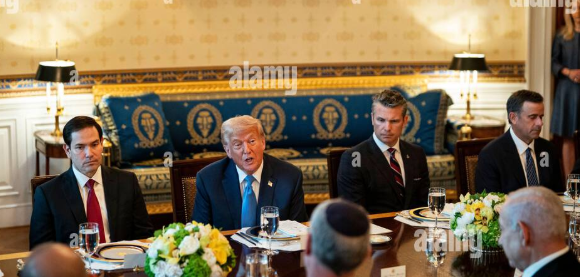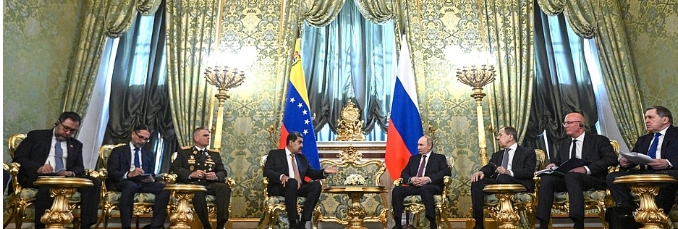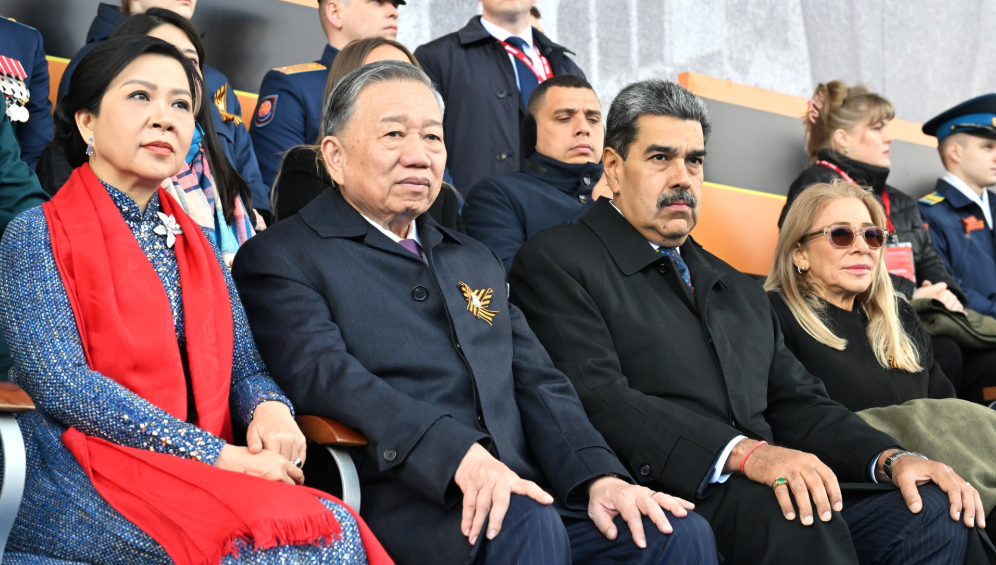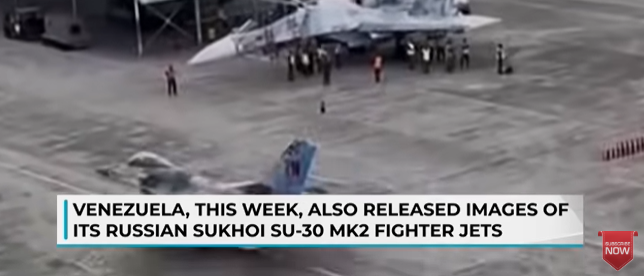 [1]
[1]
By John Helmer, Moscow
@bears_with [2]
Last week, according to the New York Times [3], the Venezuelan President Nicolás Maduro was reported to have tried to head off President Donald Trump’s escalation to frontal military attack on Venezuela and regime change in Caracas by offering “a dominant stake in Venezuela’s oil and other mineral wealth in discussions that lasted for months, according to multiple people close to the talks.” Reportedly, Maduro’s terms included: “all existing and future oil and gold projects to American companies, give preferential contracts to American businesses, reverse the flow of Venezuelan oil exports from China to the United States, and slash his country’s energy and mining contracts with Chinese, Iranian and Russian firms.”
If Maduro did that, Russian sources concede hypothetically, it would amount to his revocation of Article 6 and Article 10 of the “Agreement between the Russian Federation and the Bolivarian Republic of Venezuela on Strategic Partnership and Cooperation [4]”.
The first provision of the treaty calls [4] for “joint initiatives within the framework of OPEC+, the Forum of Gas Exporting Countries and other multilateral organizations, [to] promote balanced and stable long–term development of global energy markets without using artificial restrictions and unfair competition tools”. The second proposed to “cooperate in the energy sector in such areas as the exploration and development of new oil and natural gas fields, increasing the returns of fields operated by joint ventures and reducing their environmental impact.”
Maduro signed the instrument of treaty ratification in front of the Russian Ambassador to Venezuela on October 7 [5]. But that was several days after Maduro had been told the Trump Administration had purported his scheme to replace the Russian oil companies with American ones, and had cancelled negotiations on Maduro’s term sheet led by Richard Grenell [6].
For the time being, there has been no ratification of the Venezuelan strategic partnership treaty by the State Duma in Moscow. When Venezuela’s Ambassador to Moscow, Jesús Salazar Velázquez, visited the Duma on October 6, ratification was discussed but not agreed. Instead, the official Duma communiqué [7] reported that Velazquez had agreed with Duma deputy chairman Ivan Melnikov — a Communist Party faction leader who ranks third in the parliamentary leadership — to “express solidarity in countering Western military-political and financial-economic pressure. Both sides noted the importance of inter-parliamentary cooperation as part of bilateral interaction and discussed the possibility of holding a meeting of the Russia-Venezuela and Venezuela-Russia parliamentary friendship groups via videoconference in the near future.”
President Putin has twice stopped short of the opportunity to express his solidarity with Maduro. On October 2, during his appearance at the Valdai Club conference, Putin acknowledged that the French commando boarding of a tanker carrying Russian oil was “piracy”. Illegal yes, but Russia is not going to be provoked, Putin said [8]. The French “want very much to transfer the tension from inside the country to the external contour, to excite some other forces, other countries, in particular Russia, to provoke us into some vigorous actions.”
Trump’s attacks on Venezuelan boats off the coast, which began in September and have been justified in Washington as an operation against drug smugglers, have not been explicitly condemned by the Kremlin. They have been called piracy by the Kremlin-funded security analysis platform Vzglyad [9].
At Putin’s last opportunity, in a press conference in Dushanbe on October 10, he was asked: “It has just been announced that Donald Trump did not receive the Nobel Peace Prize. In your opinion: should he have received it, did he deserve it, was he worthy of it?” By then Putin knew the prize had been awarded to the US backed regime-change candidate to overthrow Maduro, Maria Corina Machado. In his reply, Putin ignored Venezuela and praised Trump.
“It is not for me,” he said [10] “to decide who should be awarded the Nobel Peace Prize… There have been cases where the committee awarded the Nobel Peace Prize to individuals who had done nothing for peace. In my view, these decisions inflicted enormous damage on the prize’s prestige. A person comes along – good or bad – and within a month or two, boom. For what? They had done absolutely nothing. Is that how it should work? It ought to be awarded for actual merits. Consequently, I believe, its prestige has been significantly undermined. But that is neither here nor there – it is not for me to judge. Whether or not the incumbent President of the United States deserves the Nobel Peace Prize, I do not know. But he has genuinely done much to resolve complex crises that have persisted for years, if not decades. I have said this before – I know for certain: regarding the crisis in Ukraine, he sincerely strives for a resolution. Some things have worked out, others have not. Perhaps much more can still be achieved based on the agreements and discussions in Anchorage. But he is certainly making an effort, certainly working on these issues – issues of achieving peace and resolving complex international situations [10].”
CCCP — cold comfort for Caracas from Putin.
What exactly Maduro had meant by “slashing” Russian contracts with Venezuela was not spelled out in the US newspaper report – if the offer had been made at all; the newspaper claimed to have sourced it from unidentified Venezuelan officials in Caracas, as well as from State Department and CIA officials in Washington who still talk to the New York Times. One of the Times reporters who wrote the story, Julian Barnes, has made a record of publishing whatever disinformation his CIA sources tell him, and never correcting the lies when he is found out. [11] Whatever the terms may have been, however, they have been rejected [12] by Marco Rubio as Secretary of State and National Security Advisor and by the CIA Director, John Ratcliffe.
Grenell, the principal US negotiator with Venezuela, was withdrawn by a Trump order on Rubio’s and Ratcliffe’s urging at the White House on October 2 [13]. The White House meeting with Trump that day was not identified in the official schedule, although an intelligence briefing for Trump, a once-a-week event, was posted [14]. Trump may have been told after the decision had been agreed.
 [15]
[15]SecState Rubio (left) and D/CIA Ratcliffe (extreme right) at White House meeting with Prime Minister Benjamin Netanyahu on July 7, 2025.
The White House meeting was followed by Trump’s tweet the next day, October 3 [16], announcing that “a boat loaded with enough drugs to kill 25 TO 50 THOUSAND PEOPLE was stopped, early this morning off the Coast of Venezuela, from entering American Territory. “ The destruction of the boat and its crew was depicted by Trump in a 37-second video clip (lead images). No data were provided of the location of the vessel when it was attacked “off the coast of Venezuela”. Between that coastline and the Florida Keys, the nearest US mainland, is a distance of more than one thousand nautical miles.
Trump followed in a speech [17] on board the aircraft carrier USS Harry Truman: “there are no boats in the water anymore. You can’t find any. We’re having a hard time finding them. But you know, it’s a pretty tough thing we’ve been doing. But you have to think of it this way. Every one of those boats is responsible for the death of 25,000 American people, and the destruction of families. So when you think of it that way, what we’re doing is actually an act of kindness. But, we did another one last night. Now we just can’t find any. You know, it’s the old story we — we’re do — We’re so good at it, that there are no boats. In fact, even fishing boats, nobody [Laughs] wants to go into the water anymore. Sorry to tell you that. But it’s, uh, we stopped. We’re stopping drugs coming into America.”
 [18]
[18]The two presidents, Putin and Maduro, met for talks and the signing of their agreement in the Kremlin on May 7, 2025 [19]. The Russian communiqué did not mention defence or military security. According to the Kremlin, Rosneft participated in the talks. “Taking part in the restricted format talks on the Russian side were Foreign Minister Sergei Lavrov, Deputy Prime Minister – Head of the Russian part of the Intergovernmental Russian-Venezuelan High-Level Commission Dmitry Chernyshenko, Presidential Aide Yury Ushakov, and Chairman of Rosneft Management Board Igor Sechin.”
According to the text of the Russia-Venezuela strategic partnership agreement, signed by Putin and Maduro on May 7 [4] in Moscow, there was agreement on “rejection of hegemony” and opposition to US and NATO economic sanctions as “a manifestation of neo-colonialism, an instrument of pressure, economic strangulation, and undermining the domestic political stability of sovereign states. The Parties do not support or join the unilateral coercive measures used by individual states and their associations.” The treaty language is decidedly more Venezuelan than Russian.
Article 14 [4] of the pact is more Russian than Venezuelan, and much less explicit. “The parties are improving defence relations in areas of mutual interest…The parties carry out military-technical cooperation in the interest of strengthening the defence capability and ensuring the security of the two countries within the framework of the implementation of existing agreements, contracts and facilitate the conclusion of new agreements.” This promised less on the Russian side than the arms supply and $2 billion loan according to the joint projects agreement signed by then President Hugo Chavez and Foreign Minister Maduro in September 2009 [20].
Also, the new “strategic” defence provision is significantly less committal for Putin than the terms of the strategic treaties he has signed with North Korea (June 2024) and Iran (January 2025). Compare them by clicking here [21].
 [22]
[22]President Maduro and his wife on the Kremlin review stand at the May 9, 2025 [23], military parade, seated next to General Secretary of the Communist Party of Vietnam Central Committee To Lam, and his wife.
According to Putin in his video conference [24] with Maduro in March, “today, our relations have reached the level of strategic partnership. Mr President, today you carry on the Comandante’s cause, upholding your country’s sovereignty and steadfast course on close cooperation with Russia, which is traditionally built on the foundation of friendship, mutual trust and consideration of each other’s interests. For its part, Russia is doing and will continue to do everything possible to make our joint efforts in the trade and economic, scientific and technical, cultural and humanitarian spheres even closer and more comprehensive. I am pleased to note that the Treaty on Strategic Partnership and Cooperation between our countries has been fully agreed upon. It will create a good, solid foundation for the further expansion of our multifaceted ties in the long term. It could be signed during your visit to Russia at any time convenient for you [24].”
Putin omitted mention of the words, military, defence, security. What then did the “partnership” for “upholding your country’s sovereignty” mean?
In the past two decades Russian arms have been supplied to Caracas with crews, trainers and advisers. However, no Russian air force or naval units participated in the Venezuelan military drill in September [25]. This compares with the deployment of Tu-160 bombers in 2018 [26], during the first Trump Administration; and deliveries of weapons systems and crews in March 2019 [27], and again in June [28] of the same year.
 [29]
[29]September 20, 2025 [30]. This report does not identify any Russian weapons deliveries or deployments since the May agreement was signed.
US-based assessments of Venezuela’s current operational capacities are mixed. “Venezuela has an unusually varied collection of air defence assets, including smaller numbers of more capable systems. However, even most of the older surface-to-air missile systems have been upgraded and, as stated earlier, are generally highly mobile, meaning they can appear virtually anywhere, disrupting carefully laid mission plans. They could still pose a threat that would have to be taken seriously during any kind of offensive U.S. air operation directed against Venezuela…At the very least, it might be expected that the Venezuelan air defence picture would prompt the U.S. military to rely heavily on stealthy aircraft like the F-35, especially for any direct strikes on targets in defended areas of the country, as well as costly standoff munitions. Such a campaign would also require the support of defence-suppression assets and other support aircraft with their associated capabilities [31].”
In mid-2024, the Pentagon-funded Centre for Strategic and International Studies in Washington concluded that Russia’s readiness to support Venezuela in a military conflict with the US is more symbolic than substantial. “Russia’s actions in the Caribbean are a form of symbolic engagement with allies that typically challenges U.S. leadership in the region… in contrast to the United States’ tangible support for Ukraine, Russian actions have been primarily symbolic, demonstrating Moscow’s capacity to engage countries close to U.S. territory and highlighting Washington’s failure to isolate Russia globally. Yet, it also indicates that Moscow is comfortable operating in the Western Hemisphere, underscoring the potential for escalation [32].”
Oleg Tsarev — a leading Ukrainian opposition figure and candidate president for Kiev currently in exile in Crimea — has observed: “China and Russia…are major investors in Venezuela’s oil industry. China buys more than 90% of all Venezuelan oil, and is also one of the main creditors of Caracas. Russian investment exceeds $4 billion. In the event of an American invasion of Venezuela or a change in the foreign policy of Maduro, Moscow and Beijing are likely to lose their investments. Maria Machado, the newly minted Nobel laureate and leader of the Venezuelan opposition, has also offered projects worth almost $2 trillion over 15 years to the Americans. In general, the government and the opposition of Venezuela are now competing to see who will offer Trump more and appease him better.”
“But, as practice shows, attempts to buy off the Americans, if they are firmly focused on regime change, do not lead to anything good. Maduro would be especially foolish to sacrifice relations with China and Russia at the request of the United States. This will only hasten his end if Trump nevertheless gives the go-ahead for a change of power in Caracas.” – October 11 [33].